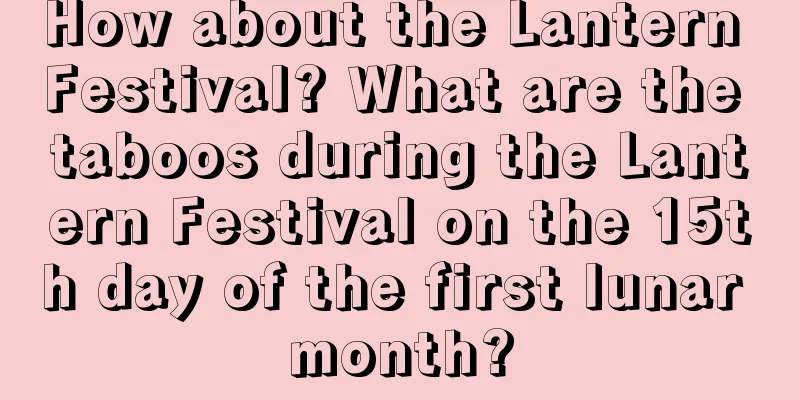What day is the 15th day of the first lunar month in 2018 and what are the customs?

The first month of every year is a festive day, during which there are many folk activities and many special foods. The fifteenth day of the first lunar month is the first major festival after the Spring Festival, and it is also a major festival in the first lunar month and also has many folk customs. If you want to know more about the first month of the lunar calendar in 2018, please pay attention to our fortune teller website!What day is the 15th day of the first lunar month in 2018?The 15th day of the first lunar month of the year 2018 (Friday, March 2, 2018) [Today’s calendar is suitable]Marrying, breaking ground, traveling, taking up a post, accepting money, hiding treasure, seeking a son, seeking heirs, and governing the way [Today's taboos in the almanac] Put up beams and erect pillars, offer sacrifices, pray for blessings, plant crops, dig canals, release water, build houses, build bridges, build embankments, open warehouses, relieve diseases, open markets, set up meridians, admit livestock, break ground, start drilling, bury, move into new homes, and place incense. The fifteenth day of the first lunar month in 20018 is the traditional Lantern Festival in my country. What are the customs of the Lantern Festival?Eating Yuanxiao is eaten on the fifteenth day of the first lunar month. "Yuanxiao" as a food has a long history in China. In the Song Dynasty, a novel food for the Lantern Festival became popular among the people. This kind of food was first called "Fuyuanzi" and later called "Yuanxiao". Businessmen also called it "Yuanbao". Yuanxiao, also known as "tangyuan", is filled with sugar, rose, sesame, bean paste, osmanthus, walnut kernels, nuts, jujube paste, etc. It is wrapped in glutinous rice flour into a round shape. It can be meat or vegetarian, with different flavors. It can be cooked in soup, fried, or steamed, symbolizing reunion and happiness. The glutinous rice balls in Shaanxi are not wrapped but "rolled" in glutinous rice flour and then boiled or fried. They are hot and round.Viewing Lanterns During the Yongping reign of Emperor Ming of the Han Dynasty (58-75 AD), Emperor Ming promoted Buddhism. Coincidentally, Cai Yin returned from India after seeking Buddhism. He said that on the fifteenth day of the first lunar month in the Indian kingdom of Magadha, monks would gather to pay homage to the Buddha's relics. It was an auspicious day to visit the Buddha. In order to promote Buddhism, Emperor Ming of Han ordered that "lights be lit to show respect to Buddha" in the palace and temples on the fifteenth night of the first lunar month. From then on, the custom of lighting lanterns during the Lantern Festival spread from being only held in the palace to the common people. That is, every fifteenth day of the first lunar month, both nobles and common people would hang lanterns, and cities and towns would be brightly lit all night long. The custom of lighting lanterns during the Lantern Festival developed into an unprecedented lantern fair in the Tang Dynasty. At that time, the capital Chang'an was already the largest city in the world with a population of one million and a prosperous society. Under the emperor's personal advocacy, the Lantern Festival became more and more luxurious. After the middle Tang Dynasty, it has developed into a carnival for the whole nation. During the Kaiyuan Period (685-762 AD) of Emperor Xuanzong of Tang, the Lantern Festival in Chang'an was very grand, with 50,000 lanterns lit and a wide variety of lanterns. The emperor ordered people to build a giant lantern tower, which was 20 rooms wide and 150 feet high. It was dazzling with golden light and extremely spectacular. In the Song Dynasty, the Lantern Festival surpassed that of the Tang Dynasty in terms of scale and the fantasy and exquisiteness of the lanterns. The activities were more folk-oriented and had stronger national characteristics. In the following generations, the Lantern Festival continued to develop and the duration of the festival became longer and longer. The Lantern Festival in the Tang Dynasty was "one day before and after the Lantern Festival". In the Song Dynasty, two days were added after the 16th. In the Ming Dynasty, it was extended to a full ten days from the 8th to the 18th. In the Qing Dynasty, the Manchus took control of the Central Plains and the palace no longer held lantern festivals, but folk lantern festivals were still spectacular. The date was shortened to five days and continues to this day. In Taiwan, lanterns represent brightness and the birth of a new child. Lighting a lantern means illuminating the future. In Taiwanese, the homophones of "lantern" and "ding" represent the birth of a boy. Therefore, women in the past would deliberately walk under the lanterns during the Lantern Festival, hoping to "drill under the foot of the lantern to give birth to an egg". Valentine's Day and the Lantern Festival are also romantic festivals. In the feudal traditional society, the Lantern Festival also provided an opportunity for unmarried men and women to get to know each other. Young girls in traditional society were not allowed to go out freely, but they could go out to play in groups during the festival. Viewing the lanterns on the Lantern Festival was a good opportunity for socializing, and unmarried men and women could also look for partners while viewing the lanterns. During the Lantern Festival, it is an opportunity for young men and women to meet their lovers. In Taiwan, there is a traditional custom that unmarried women who steal onions or vegetables on the night of the Lantern Festival will marry a good husband. The custom is commonly known as "steal onions and marry a good husband" or "steal vegetables and marry a good son-in-law." Girls who hope to have a happy marriage must steal onions or vegetables from the vegetable garden on the night of the Lantern Festival, looking forward to a happy family in the future. In the Tang Dynasty, there were also music and dance performances at the Lantern Festival, with thousands of palace maids and folk girls singing and dancing under the lanterns, which was called walking songs and stepping songs. Ouyang Xiu (Shengchazi) said: During the Lantern Festival last year, the lights in the flower market were as bright as day; the moon was above the treetops, and people made appointments after dusk. Xin Qiji (Qingyu'an) wrote: I searched for him among the crowd for hundreds of times, and when I turned around, he was standing in the dim light. It describes the situation on the Lantern Festival night. In the traditional opera, Chen San and Wu Niang met and fell in love at first sight while watching lanterns on the Lantern Festival. Lechang Gongwen and Xu Deyan reunited on the Lantern Festival night. In "Spring Lantern Riddles", Yuwen Yan and Ying Niang got engaged on the Lantern Festival. Therefore, the Lantern Festival is also China's "Valentine's Day". In addition to celebrations, the Lantern Festival also has religious activities. That is "walking away from all diseases", also known as "roasting away all diseases" and "dispersing all diseases". Most of the participants are women. They walk in groups, either walking along the wall, crossing the bridge or walking in the suburbs, with the purpose of driving away diseases and disasters. As time goes by, there are more and more activities on the Lantern Festival. Many places have added activities such as dragon lantern and lion dances, stilt walking, land boat dances, yangko dance, and Taiping drums to the festival. There are some little-known and lost folk activities during the Lantern Festival on the 15th day of the first lunar month. Here are a few of them. There were "seven sacrifices" in ancient times, namely sacrifices to doors and sacrifices to households, and these are two of them. The method of sacrifice is very simple. Insert a poplar branch above the door, insert a pair of chopsticks in a bowl of bean porridge, or directly place wine and meat in front of the door. The activity of chasing rats is mainly aimed at silkworm farmers. Because mice often eat large numbers of silkworms at night, people heard that if you feed mice with rice porridge on the fifteenth day of the first lunar month, they will stop eating silkworms. Therefore, these families would cook a big pot of sticky porridge on the fifteenth day of the first lunar month. Some would even cover it with a layer of meat. They would put the porridge in bowls and place them on the ceilings and corners where mice were active. They would mutter something while putting the porridge in their mouths, cursing the mice that they would not have a good death if they ate silkworms again. Welcoming Zi Gu Zi Gu is a kind, poor girl in folk legends. On the fifteenth day of the first lunar month, Zi Gu died of poverty. The people sympathized with her and missed her, and in some places the custom of "welcoming Zi Gu on the fifteenth day of the first lunar month" emerged. Every night on this day, people make a life-size portrait of Zi Gu out of straw and cloth. The women stood by the toilet, pigpen and kitchen where Zi Gu often worked to welcome her. They held her hands, spoke kind words to her and comforted her with tears, just like they would their own sister. The scene was very vivid and truly reflected the working people's thoughts and feelings of kindness, loyalty and sympathy for the weak. |
<<: Can I move to a new home during the Jingzhe period of 2018? What are the taboos of moving?
>>: Is Jingzhe a good day? When is the Waking of Insects?
Recommend
What are the taboos on the 17th day of the sixth lunar month in 2019?
The sixth month of the lunar calendar is the most...
What month is the seventh month in the lunar calendar? When is the Ghost Festival (Zhongyuan Festival) in July?
The seventh month of the lunar calendar is a month...
List of the positions of the gods of happiness at different times on the tenth day of the twelfth lunar month in 2020
When the twelfth lunar month comes, the winterswe...
Where is the God of Happiness on the 11th day of the first lunar month in 2019?
Shuimoxiansheng.com provides you with more conten...
What traditional food do we eat during the Mid-Autumn Festival? Is it good to eat crabs during Mid-Autumn Festival?
The food for different festivals is also different...
Is it a good time to move on May 22, 2018 in the lunar calendar?
The Book of Songs records that “cicadas chirp in ...
How is the 13th day of the third lunar month in 2022? Can we get engaged?
Although many people get engaged every day, not ev...
Fate analysis of those born on New Year’s Day under the zodiac sign of the sheep. Is their fate good?
The fortune of the zodiac sheep is related to the ...
Minor Snow Folk Songs Is it taboo to migrate during the Minor Snow solar term in 2020 in the middle and lower reaches of the Yellow River?
Introduction: Different regions have different wea...
Is it good to have a baby born in the twelfth month of the lunar calendar? Personality analysis of children born in the twelfth month of the lunar calendar
The twelfth month of the lunar calendar is the las...
What are the best gifts for the New Year?
The Spring Festival is here, and it seems to have ...
How is the seventh day of the seventh lunar month in 2017? Is it suitable for house decoration?
Introduction: Now that housing prices are rising d...
Things to note for the beginning of summer 2022
The Chushu fortune refers to the concept in numero...
Is January 18th of the lunar calendar 2020 an auspicious day? Can I travel?
In ancient times in our country, traveling would t...
What do you need to prepare for burning winter clothes on October 1st? What do you need to pay attention to when burning winter clothes?
During the Cold Clothes Festival, people in many a...









